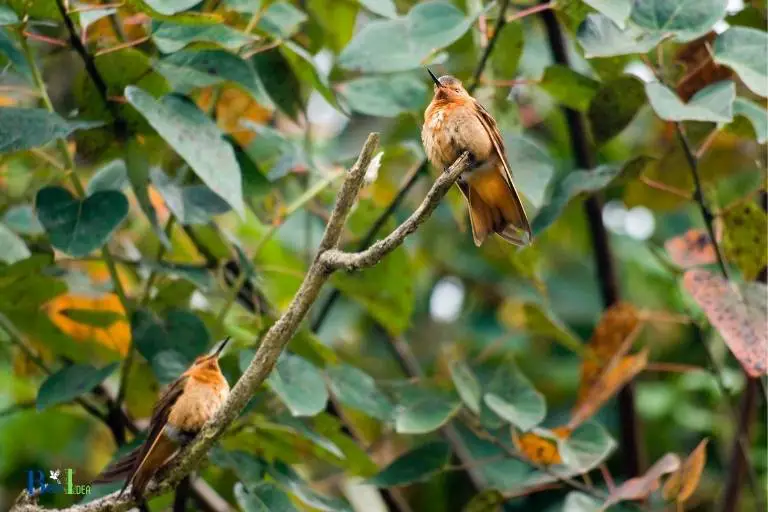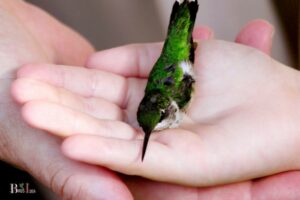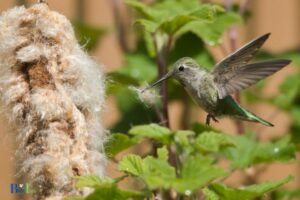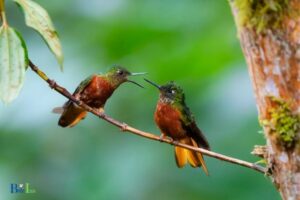Do Hummingbirds Sleep Together at Night: No!
No, hummingbirds do not sleep together at night. They sleep individually, hanging upside down on tree branches or sheltered perches.
Hummingbirds are solitary creatures and do not form strong social bonds with each other, even during mating season.
At night, they enter a state called torpor, which conserves energy by slowing down their metabolism and body temperature.
They find a safe and sheltered place, often hanging upside down from a tree branch or hidden in foliage, to rest for the night.
Hummingbirds are known for their incredible agility, fast wing speeds, and vibrant colors, but they are also fascinating in their sleep habits.
As they don’t sleep together at night, they rely on finding secure and concealed spots to ensure their safety while in torpor.
Hanging upside down helps them maintain a secure grip and offers some protection from predators. Due to their solitary nature, it is quite rare to see multiple hummingbirds sleeping close to each other.
7 Aspects: Hummingbirds Sleep Together at Night
| Aspect | Description |
|---|---|
| Sleep Habits | Hummingbirds do not sleep together at night. They are solitary sleepers and each hummingbird chooses its own perch or tree to sleep. |
| Nighttime Behavior | Hummingbirds, like many bird species, enter a state of torpor at night to conserve energy. This state of deep sleep reduces their physiological activity, allowing them to survive the night without feeding. |
| Mating Season | During the mating season, male and female hummingbirds may share the same general sleeping area, but they still sleep alone. |
| Predators | Hummingbirds sleep alone to protect themselves from predators. Sleeping together would attract predators and put them all at risk. |
| Territory | Hummingbirds are highly territorial and do not like to share their sleeping areas with others. |
| Migration | During migration, hummingbirds still sleep alone. They will seek out a safe place to rest each night. |
| Nesting | Only female hummingbirds build nests and they alone sleep in them. They do not share these nests with males or other females. |
Key Takeaway

Five Facts About: Hummingbirds’ Nighttime Behavior
The Sleep Patterns Of Hummingbirds
Hummingbirds are some of the most fascinating creatures in the avian world. They are known for their agility, speed, and their unique sleeping habits.
One question that has puzzled bird enthusiasts for a long time is whether these birds sleep alone or together.
So, let’s delve deeper into the sleeping patterns of hummingbirds.
Description Of How Hummingbirds Sleep
Hummingbirds sleep a lot like other birds, but with a few notable exceptions. When they enter into deep sleep, they go into a state of torpor, where their metabolism slows down, and their body temperature drops significantly.
Unlike other birds, hummingbirds don’t close their eyes when they sleep.
They have an extra eyelid that covers their eye and keeps it moist, allowing them to keep watch while they rest.
The Differences Between Sleeping Patterns Of Hummingbirds And Other Birds
Hummingbirds are unique in their sleeping patterns. Unlike other birds, they don’t sleep for long periods. They take frequent naps throughout the day, and they even sleep while perched vertically.
They also have a shorter sleep cycle, lasting for only a few seconds at a time, rather than several minutes like other birds.
Additionally, hummingbirds don’t go through the same stages of sleep as other birds. They don’t enter into rapid eye movement (rem) sleep, which is associated with dreaming and memory formation.
Theories Behind The Unique Sleeping Habits Of Hummingbirds
Scientists have put forth several theories about why hummingbirds have such unique sleeping habits. One theory is that it helps them conserve energy.
Hummingbirds have a high metabolic rate and need to consume a lot of nectar to stay alive.
By taking frequent naps, they can rest and conserve energy while still being alert to any threats.
Another theory is that their sleeping patterns are linked to their feeding habits. Since hummingbirds need to feed frequently, they may need to take short naps to avoid being caught off guard by predators while feeding.
Description Of A Hummingbird’S Sleeping Position
When hummingbirds sleep, they often perch on a branch or wire. They usually sit with their head tucked under their wing and their feet tightly gripped around the perch.
This allows them to conserve energy and maintain their position while sleeping.
Hummingbirds are unique in their sleeping habits, taking frequent naps throughout the day, perching vertically, and entering into torpor while they rest.
While there are several theories about why hummingbirds have these unique sleeping patterns, scientists are still trying to unravel the mysteries of these fascinating creatures.
Why Do Hummingbirds Sleep Alone Or In Groups?
Theories Behind Why Hummingbirds Sleep Alone Or In Groups
Hummingbirds are intriguing creatures that hold numerous questions, including why they sometimes sleep alone or in groups. There are two main schools of thought on this topic social and ecological.
- Ecological theory suggests that hummingbirds sleep alone or in groups based on the ecological factors in their environment, such as temperature and food availability.
- Social theory posits that hummingbirds sleep in groups as a means to reduce predation, conserve energy, and maintain better body temperatures.
Study Of Their Social Nature
Hummingbirds are known to be highly social animals that exhibit different behaviors in different environments. Their social behavior influences how they sleep and interact with other hummingbirds.
- As territorial creatures, hummingbirds often establish specific sleeping locations that they defend from other birds.
- Hummingbirds also display social sleep behaviors, such as huddling in groups to conserve energy or protect against predators.
Impact Of Temperature And Weather Conditions On Their Sleeping Patterns
Temperature and weather conditions play a crucial role in how hummingbirds sleep. They have specific adaptations that enable them to survive in extreme temperatures, but it also affects their sleeping patterns.
- In colder temperatures, hummingbirds can enter torpor states that slow down their physiological processes and conserve energy.
- During warmer temperatures, they may sleep less to maintain their body temperature and reduce energy expenditure.
The reasons why hummingbirds sometimes sleep alone or in groups are complex and multifaceted.
Ecological and social factors as well as temperature and weather conditions all play a role in how and why hummingbirds sleep.
Understanding these unique behaviors and adaptations is critical as we work to conserve these remarkable creatures.
Do Hummingbirds Exhibit Any Protectiveness Or Aggressiveness While Sleeping?
Observations Of Hummingbirds’ Behavior During Resting Hours
Hummingbirds are small, energetic birds that move rapidly, but they also need rest just like any other bird.
Here are some common observations of hummingbirds’ behavior during their period of rest:
- Hummingbirds tend to rest on a branch or twig. During rest, they often tuck their beaks under their wings.
- They choose a safe place to rest, which is usually high up, to escape from predators.
- Hummingbirds rest by sitting still for long periods with eyes closed for deep sleep.
Discussion On Whether Hummingbirds Exhibit Any Protectiveness Or Aggressiveness While Sleeping
Hummingbirds are known for their territorial nature and are often seen engaging in intense fights with each other. It is unclear whether their territorial behavior carries forward while they sleep.
Here are some points that need to be taken into consideration:
- While hummingbirds could potentially exhibit some form of territorial behavior during sleep, it is unlikely since they need rest to prepare for the next day.
- There is no concrete evidence to suggest that hummingbirds become aggressive or protective in their sleep.
- Hummingbirds are solitary birds, and they tend to rest individually, which reduces the likelihood of confrontation.
Theories Behind Hummingbirds’ Territorial Nature And Whether It Carries Forward While They Sleep
Hummingbirds are territorial birds and will fight aggressively to protect their space, food sources, and potential mates from other birds.
Here are some theories behind their territorial nature and whether it carries forward while they sleep:
- Territorial behavior is driven by the need to establish a feeding zone, defend a nesting site, and attract mates.
- Hummingbirds are known to defend their territory actively, and their territorial nature is not likely to change even while they sleep.
- The hummingbird’s territorial instinct might not be as active while asleep as it is when they are awake, but they remain aware of their surroundings as a survival tactic.
While there isn’t any evidence to suggest that hummingbirds become aggressive or protective while they sleep, their territorial nature does carry forward even in their resting hours.
Understanding their behavior while resting can give us a peek into their fascinating lives.
Sleep Deprivation And Its Impact On Hummingbirds
The Effects Of Sleep Deprivation On Hummingbirds
As small and active birds, hummingbirds have a high metabolism and require a lot of energy to maintain their daily activities, including foraging, mating, and defending their territories.
Sleep is essential for all animals, including hummingbirds, to consolidate memories and recharge their energy levels.
But, just how important is sleep for these tiny creatures?
Let’s take a look at the effects of sleep deprivation on hummingbirds:
- Hummingbirds may experience impaired cognitive functions, reduced learning abilities, and memory consolidation due to lack of sleep.
- Sleep-deprived hummingbirds may become slower, less alert, and less efficient when it comes to foraging, mating, and defending their territories.
- Sleep deprivation may affect hummingbirds’ immune system function, making them more susceptible to diseases and infections.
- Unfortunately, in the wild, sleep deprivation is common among hummingbirds, which may lead to long-term detrimental effects on their health and survival.
How Long Hummingbirds Can Go Without Sleep
Given that hummingbirds are constantly active and have a high metabolism rate, one may assume that they require more sleep than other birds.
However, as it turns out, hummingbirds can get by with very little sleep, considering the amount of energy they expend in a day.
But just how long can these birds go without sleeping? Here are some important points to consider:
- Hummingbirds can survive with no sleep for several days at a time, depending on environmental factors.
- Typically, hummingbirds sleep less than other birds, with an average of only about five hours of sleep per night.
- When in breeding season, hummingbirds may sleep even less, averaging only two hours a night.
Research On The Consequences Of Sleep Deprivation In Wild Hummingbirds
Despite their small size, hummingbirds have been the subject of several studies investigating their sleep and activity patterns.
Research studies into the effects of sleep deprivation on wild hummingbirds have shown some interesting results.
Here are a few important findings to consider:
- Sleep-deprived hummingbirds may show reduced cognitive functions, affecting their ability to remember locations of food sources.
- Studies have shown that sleep-deprived hummingbirds have decreased immune system function and are more susceptible to parasites and pathogens.
- Hummingbirds may exhibit different sleeping patterns depending on the time of year, particularly during migration and breeding season.
- Researchers have also found that hummingbirds’ brain activity during sleep is similar to that of other birds during non-rem sleep. However, they have longer periods of rem sleep than other birds, which is believed to help with memory consolidation.
FAQ For Do Hummingbirds Sleep Together At Night
Do Hummingbirds Sleep At Night?
What Is The Sleep Pattern Of Hummingbirds?
Do Hummingbirds Sleep Alone Or Together?
What Position Do Hummingbirds Sleep In?
How Long Do Hummingbirds Sleep For?
Conclusion
Hummingbirds are fascinating creatures that lead a unique life, and their sleep habits are no exception. Despite their solitary nature, they do gather in large groups to conserve energy and maintain their body functions.
The iconic birds adhere to a strict schedule and enter a state of torpor, making them vulnerable to predators.
Research on the behavior of these birds has revealed substantial information regarding their daily routines and social interactions. While some hummingbird species sleep in groups, others do so alone, adapting to their environment and lifestyle.
It is still unknown how hummingbirds communicate with one another during their rest period, but scientists continue to study their behavior to unlock more of their secrets.
Understanding hummingbird sleep habits gives us valuable insights into the evolution of these tiny birds and provides conservationists with valuable information to protect them in their natural habitats.






